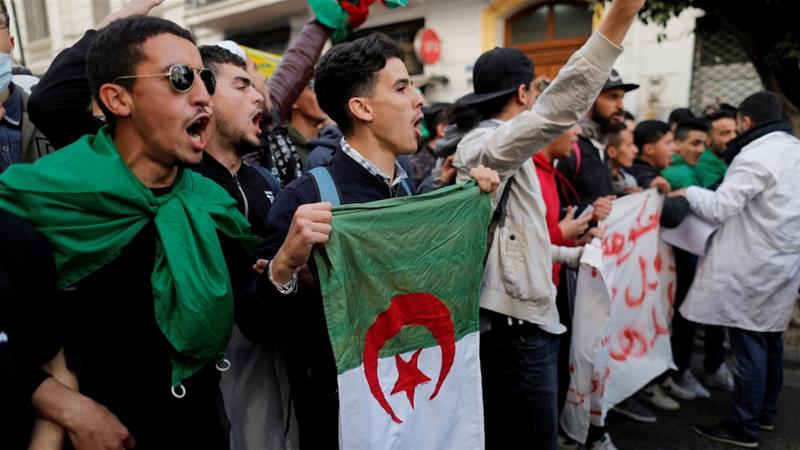Tens of thousands of Algerians have been protesting in the capital and cities across the country this week, in response to President Abdelaziz Bouteflika’s plan to extend his 20-year rule by seeking a fifth term.
Students were demanding that Bouteflika, 81, drop his intention to seek re-election in the April 18 presidential vote. Bouteflika suffered a stroke in 2013, has been seen in public only a few times since and has given no known speeches in years.
Despite the rare outpouring of public dissent, Bouteflika’s campaign manager Abdelmalek Sallal said the president would file formal papers for re-election on March 3, 15 days before the vote.
Leaked footage of a conversation between Sallal and Algerian businessman Ali Haddad also revealed Sallal stating he would be willing to shoot demonstrators if necessary, despite protest organisers affirming their peaceful nature of the rallies. (Source: Middle East Monitor, 27/02/2019)
Comment:
Algeria’s recent protests show that the Ummah in the Arab world has tired of the political and economic autocracy that has been imposed upon them for decades.
The country’s younger generation, in particular, has suffered hugely from the regime of Bouteflika; jobs are scarce with thousands of qualified youth unable to find work, but facing rising costs of living. Meanwhile, the corrupt elite has continued to profit from their offshore holdings and the sale of the country’s oil to foreign governments.
The people of Algeria have long called for Islam to be a part of their systems of governance; in 1991 the first round of elections was secured by the Islamic party, the Islamist Salvation Front. In response, the military quickly seized banning the party in 1992 and the country quickly descended into a brutal civil war that led to the deaths of more than 200,000 Algerians by 1999.
The subsequent instability has left a resounding impact on Algerian society, which many have cited as the reason that Algeria did not fall victim to the 2010 uprisings experienced in neighboring Tunisia and elsewhere in the Arab world.
However, the recent peaceful demonstrations are a sign that the people have had enough of being silent and repressed. A new empowered generation is emerging and by the will of Allah, they will call for the Islamic Shariah, remove the shackles of the old regime and lead a life of opportunity and progress, which will be achieved by implementing Islam as a holistic and ideological system.
The era of turmoil is upon us. Insecurity and bloodshed have become the norm, and as we progress as an Ummah towards political unity under Islamic governance, the Muslim lands may face further boycott and assault. In light of this, we must ensure the Muslim psyche is firm in its rejection of secularism and liberal democracy. The worth of the Shariah as the best system should be clear from the intellectual and Islamic basis in the Muslim mind, and every believer should fear that ‘wahn’, (the love of life and fear of death) should settle in his heart.
Brothers and sisters around the world should raise their voices in support of our Ummah in Algeria, and encourage our men and women, old and young to use their academia, Islamic knowledge, skills and principled Islamic understanding in the dawah to support the call for the Islamic Khilafah (Caliphate), and think further than the comfort zone of our local interests.
وَالْمُسْتَضْعَفِينَ مِنَ الرِّجَالِ وَالنِّسَاء وَالْوِلْدَانِ الَّذِينَ يَقُولُونَ رَبَّنَا أَخْرِجْنَا مِنْ هَـذِهِ الْقَرْيَةِ الظَّالِمِ أَهْلُهَا وَاجْعَل لَّنَا مِن لَّدُنكَ وَلِيًّا وَاجْعَل لَّنَا مِن لَّدُنكَ نَصِيرًا
“…. those weak, ill-treated and oppressed among men, women, and children, whose cry is: “Our Lord! Rescue us from this town whose people are oppressors; and raise for us from You, one who will protect, and raise for us from You, one who will help”.
[Surah An-Nisa: 4:75]
Maleeha Hasan

